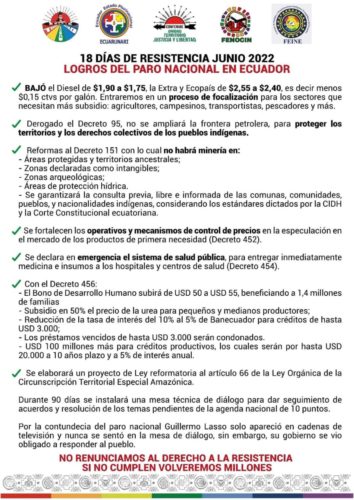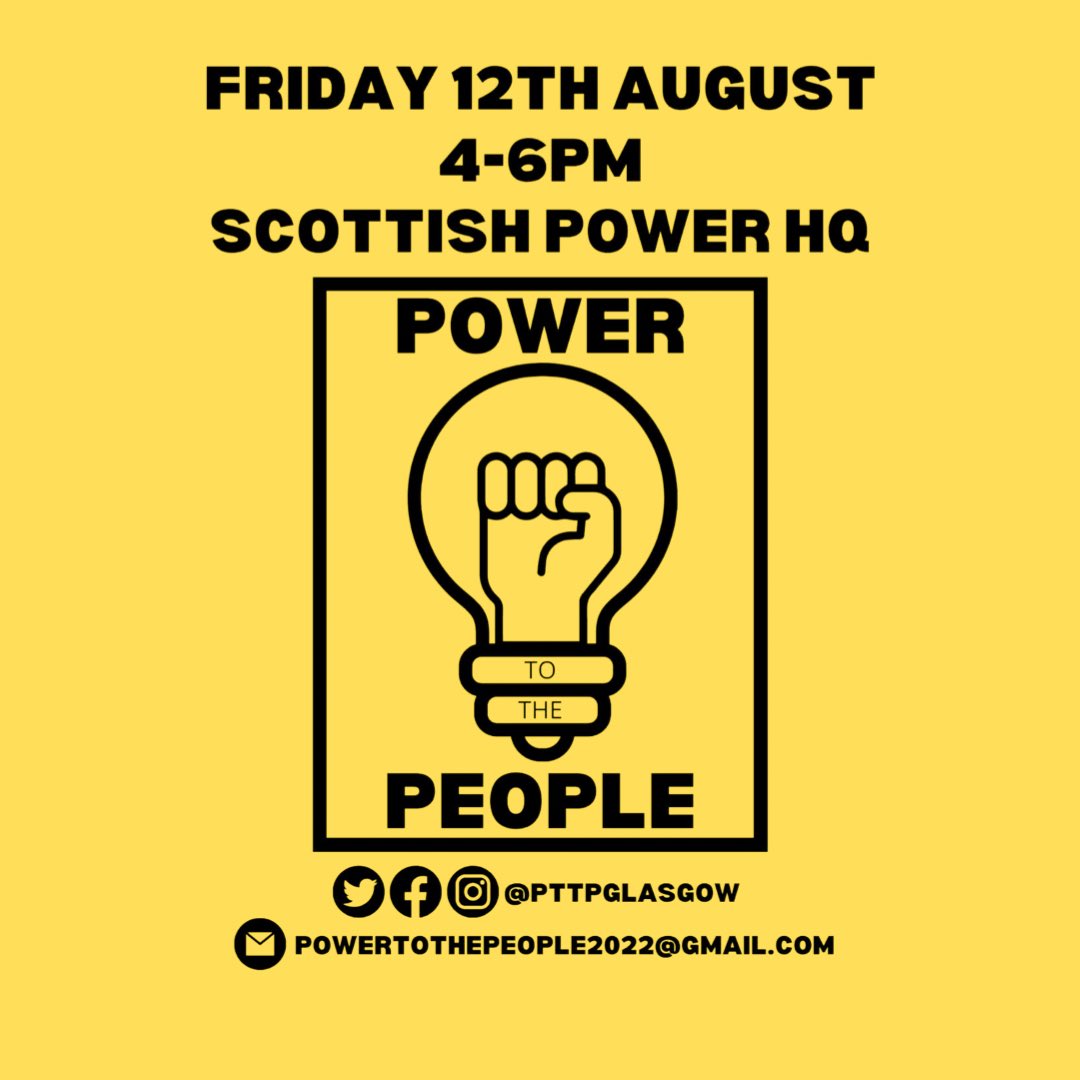The 18 day mass strike and protest movement in Ecuador has ended after negotiations with the neo-liberal government resulted in a major victory for the indigenous movement that launched it. ecosocialist.scot activists report on the latest developments.
Negotiations were concluded on 30 June with significant concessions agreed by the government of right wing banker President Lasso. These were greeted with acclaim by indigenous protestors who returned from the capital Quito to be met with mass rallies and triumphant scenes in the areas of the country where they are concentrated (photos and videos above and below).
Their leader, Leonidas Iza, was greeted as a hero by the indigenous population.
Crucially the movement has given the government only 90 days to show significant progress on implementing the agreement – otherwise the strike will start again
On the price of fuel, one of the major demands, there was only a minor concession. The government agreed to a 15 cent reduction in prices while the movement demands 40 cents. There was debate amongst activists as to whether this meant the mobilisations should continue
However, the protests were never about one issue – the indigenous organisations had put forward a list of ten interlinked and radical demands covering a range of economic, social and ecological issues.
So the fact that Lasso has agreed to stop expansion of extraction of natural resources in indigenous community areas and to give their organisations real rights of veto of any proposed exploitation of the environment is very important. Two decrees were revoked that would have enabled more oil drilling in the Amazon and mining on indigenous and protected lands, as well as in areas that are important water reserves and of archaeological significant.
The government also agreed to increase investment in health and education that has been suffering from massive underinvestment in indigenous areas.
A series of joint commissions will examine other proposals, but the pause in the strike and protest actions is only temporary – in 90 days time the indigenous movement will review the situation, judge whether the government has moved sufficiently, and decide whether to resume the strike and protest action.
Mass protests rock Ecuador capital
The actions were led by the indigenous umbrella organisation CONAIE (Confederation of Indigenous Nationalities of Ecuador) and two other allied groupings, FENOCIN and FEIN. The protest strike was huge among the mainly farming based communities, and many indigenous protestors poured into the capital Quito to rock it with mass demonstrations.
They faced severe repression, with six protestors killed and hundreds beaten and arrested by brutal state forces. On the second day of the strike the leader of CONAIE, Leonardis Iza, was illegally arrested, dragged away in handcuffs by armed forces of the state and held for 24 hours. A mass protest wave against his arrest, supported by worldwide solidarity statements, forced his release and he resumed leadership of the strike movement leading the negotiations with the government.
On three occasions, the government imposed temporary ‘states of emergency’ in different parts of Ecuador, but were forced to lift each of them as part of the negotiations with the indigenous organisations and as the National Assembly of Ecuador had begun to consider a ‘no confidence’ motion in the President and demands for negotiations.
The indigenous communities of Ecuador themselves represent only about 1 million people out of 17 million. However more than 60% of the population have some indigenous ancestry. This helps to explain how the movement was able to avoid the ever present danger of isolation. More importantly, however, the indigenous movement has long been seen as the point of reference for other social movements, regardless of region or ethnic identity. Some still remember the early years of the century, when the indigenous movement helped to bring down three unpopular governments. Above all, almost everyone carries fresh memories of the successful, indigenous-led insurrection of October 2019, which is also when the figure of Leonidas Iza first emerged at the centre of the movement.
From the beginning of this nationwide strike on 13 June, the mass protests in Quito began to attract sympathy and support from other workers, from the women’s movement, and from students and universities across the country. Perhaps most importantly, they drew support from the poor urban neighbourhoods of the capital and other cities – including a large-scale operation to collect food, blankets and other supplies for the protesters who had arrived from the countryside. For the right wing recently elected President Lasso there was the danger that the movement would spread and unseat him from power. The government therefore moved from initially resisting all the demands to agreeing major concessions.
A Global Climate Justice Movement
This must be regarded as a victory for the indigenous organisations, who emerged more confident and united from the struggle. Their ten point programme of demands must be seen as a model for the type of ecosocialist movement uniting opposition to ecological neo-liberal destruction that the entire world urgently needs.
Awareness is rising globally about the importance of not just the neo-liberal attacks on living standards and the poor, but also on the importance of protecting the natural environment from devastation. Indigenous communities are increasingly seen as in the front line of defence of the planet against rampant extractivism and the need to prevent climate change.
Leonidas Iza addressed last year’s ‘From the Ground Up’ online programme, organised by the UK COP26 Coalition, in preparation for the ultimately disappointing summit outcome in Glasgow. Indigenous activists were evident in the protests in Glasgow during the two weeks of COP26 last November when the city came alight with the global climate justice movement.
More recently indigenous communities in Brazil were praised in the normally silent mainstream British media over their unstinting efforts in exposing the brutal murders of British journalist Dom Phillips and his Brazilian collaborator Bruno Pereira – murders that were clearly directly related to Phillips’ exposure of massive commercial exploitation of Amazon rainforest areas that has the backing of Brazil’s right wing President Bolsonaro. The full story of Phillips’ murder needs to be uncovered.
Tremendous victory but ecosocialist struggle continues
While the concessions by the Ecuadorian government and the scale of the mass protests represent a tremendous victory, the struggle for people and planet continues.
ecosocialist.scot helped to launch a global petition in solidarity with the struggle in Ecuador in conjunction with organisations across Latin America and other allies. We thank everyone who signed this, including leading Scottish political figures who either signed or indicated they were supportive. Such public shows of solidarity particularly from the states of the ‘Global North’ helps the protest; but in the light of developments we are suspending the petition and will encourage everyone who signed to continue to back the movement in other ways, including supporting both protests in Britain against rising energy prices and for just wage and benefit rises and the struggle against fossil fuel extraction in the North Sea.
If the Ecuadorian government backtracks, then the movement will be back on the streets in a few months and worldwide solidarity will be more needed than ever. The result of the recent elections in Colombia and Chile give encouragement, as does the routing of Macron’s candidates and the election of a radical independentist to the French National Assembly from the South American colony of French Guiana. Many eyes will also be on the forthcoming election in Brazil and the potential defeat of Bolsonaro.
But the Ecuadorian indigenous movement has shown that comprehensive ecosocialist-based demands to confront the economic, social and ecological crises, supported by strikes and mass protests, also have a major role to play. ecosocialist.scot believes we need to build a movement in Scotland that supports those demands and methods, and links up with others across the world in supporting and encouraging a global movement for people and planet.
ecosocialist.scot editorial board
1 July 2022
Media and information
Video showing the reception to the victory in Cotopaxi and in the capital
Recibimiento en Cotopaxi. Viva la… – Conaie Comunicación | Facebook
#EnVivo 🇪🇨✊🏾 ¡Solo la lucha nos… – La voz de la Confeniae | Facebook
Articles about the struggle from International Viewpoint, online magazine of the Fourth International
New lessons from the popular struggle in Ecuador: preliminary ideas – International Viewpoint – online socialist magazine
Two projects confront each other once more – International Viewpoint – online socialist magazine
“We demand that the government responds to CONAIE’s 10 points and halts repression” – International Viewpoint – online socialist magazine
Stop the represion in Ecuador! Solidarity with the indigenous-led strike! – International Viewpoint – online socialist magazine
An open scenario, with nothing decided in Ecuador – International Viewpoint – online socialist magazine
Summary of the negotiation outcome (in Spanish)


